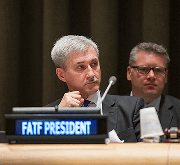New York, 18 November 2013. The FATF has collaborated closely with the United Nations since 2001 to fight terrorist financing. The connection between FATF and the UN was further strengthened when the fight against the financing of the proliferation of weapons of mass destruction was added to the FATF’s mandate.
FATF President Vladimir Nechaev elaborated on this connection between the FATF and the UN at an open briefing by the UN Security Council Sanctions Committees and the FATF.
The FATF Recommendations and its Best Practices and Guidance assist countries to effectively implement targeted financial sanctions measures against terrorist financing and proliferation financing, as required by the UN Security Council Resolutions. The FATF Recommendations also complement the UN instruments by covering additional technical issues that are not covered by the UN instruments. The FATF aims to ensure that the requirements of the FATF Recommendation are aligned with UN obligations. Thus, countries are able to implement both sets of measures with one legal or regulatory system – despite the differences that exist between both sets of requirements.
The FATF Recommendations that support countries in the implementation of the Security Council Resolutions are the following:
Recommendation 6 (Targeted financial sanctions related to terrorism & terrorist financing)
UNSCR 1267 (1999) and its successor resolutions on the situation in Afghanistan
UNSCR 1373 (2001) on threats to international peace and security caused by terrorist acts
Recommendation 7 (Targeted financial sanctions related to proliferation)
UNSCR 1718 (2006) on Non-proliferation and the Democratic People’s Republic of Korea
UNSCR 1737 (2006)on Non-proliferation and their respective successor resolutions
- The Recommendations provide guidance on the financial provisions of these resolutions, and on designations, the funds and assets that need to be frozen or immobilised, delisting, access to frozen funds and due process measures.
- The available guidance is practical, and includes references to the relevant Security Council Resolutions.
- Further guidance for both Recommendations is provided in best practices papers, which are intended for governments, but can equally be of assistance to the private sector.
Recommendation 2 (National cooperation and coordination)
UNSCR 1540 (2004) on the Non-proliferation of weapons of mass destruction
- This Recommendation addresses the non-proliferation requirements embedded in UNSCR 1540 (2004) by setting a standard for countries to ensure domestic coordination to combat proliferation financing in Recommendation 2.
- The main added value that the FATF brings in this area is the issuing of the non-binding guidance for countries on sharing of information related to the financing of proliferation among domestic competent authorities.
- The guidance assists countries when implementing the financial provision of Security Council resolution 1540 (2004).


 Twitter
Twitter
 Facebook
Facebook
 Instagram
Instagram
 Linkedin
Linkedin
